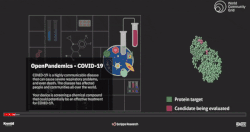 | |
| Developer(s) | |
|---|---|
| Initial release | November 16, 2004[1] |
| Stable release | 7.16.19 |
| Development status | Active |
| Operating system | • Microsoft Windows • Linux • macOS • Android • Raspberry Pi OS |
| Platform | BOINC |
| Type | Volunteer computing |
| Average performance | 402 TFLOPS[2] |
| Active users | 23,248[2] |
| Total users | 79,354[2] |
| Active hosts | 57,672[2] |
| Total hosts | 5,517,865[2] |
| Website | www |
World Community Grid (WCG) is an effort to create the world's largest volunteer computing platform to tackle scientific research that benefits humanity.[3] Launched on November 16, 2004, with proprietary Grid MP client from United Devices and adding support for Berkeley Open Infrastructure for Network Computing (BOINC) in 2005, World Community Grid eventually discontinued the Grid MP client and consolidated on the BOINC platform in 2008.[4] In September 2021, it was announced that IBM transferred ownership to the Krembil Research Institute of University Health Network in Toronto, Ontario.[5]
World Community Grid utilizes unused processing power of consumer devices (PCs, Laptops, Android Smartphones, etc.) to analyse data created by the research groups that participate in the grid. WCG projects have analysed data related to the human genome, the human microbiome, HIV, dengue, muscular dystrophy, cancer, influenza, Ebola, Zika virus, virtual screening, rice crop yields, clean energy, water purification and COVID-19, among other research areas.[6]
There are currently five active projects and 26 completed projects.[7] Several of these projects have published peer-reviewed papers based on the analysis of the data generated by WCG. These include an OpenZika project paper on the discovery of a compound (FAM 3) that inhibits the NS3 Helicase protein of the Zika virus, thus reducing viral replication by up to 86%;[8][9] a FightAIDS@home paper on the discovery of new vulnerabilities on the HIV-1 Capsid protein which may allow for a new drug target;[10][11] a FightAIDS@home paper on new computational drug discovery techniques for more refined and accurate results.[12][13]
- ^ "IBM Introduces 'World Community Grid'" (Press release). IBM. 16 November 2004. Archived from the original on 5 September 2022. Retrieved 11 February 2009.
- ^ a b c d e "BOINCStats". Archived from the original on 2023-04-05. Retrieved 2023-06-19.
- ^ "About Us". World Community Grid. Archived from the original on 19 April 2022. Retrieved 28 July 2007.
- ^ bbover3 (2007-08-17). "BOINC Migration Announcement". World Community Grid. Archived from the original on 2018-11-03. Retrieved 2007-08-17.
{{cite web}}: CS1 maint: numeric names: authors list (link) - ^ "World Community Grid finds a new home at Krembil Research Institute". www.worldcommunitygrid.org. Archived from the original on 2021-09-13. Retrieved 2021-09-13.
- ^ "We want to stop pandemics in their tracks". IBM.org. 2020-04-01. Archived from the original on 2020-04-08. Retrieved 2020-04-03.
- ^ "Research Overview". www.worldcommunitygrid.org. Archived from the original on 2022-04-18. Retrieved 2021-04-17.
- ^ Silva S, Shimizu JF, Oliveira DM, Assis LR, Bittar C, Mottin M, et al. (November 2019). "A diarylamine derived from anthranilic acid inhibits ZIKV replication". Scientific Reports. 9 (1): 17703. Bibcode:2019NatSR...917703S. doi:10.1038/s41598-019-54169-z. PMC 6881388. PMID 31776405.
- ^ "World Community Grid - News". Archived from the original on 2020-03-23. Retrieved 2020-03-17.
- ^ Craveur P, Gres AT, Kirby KA, Liu D, Hammond JA, Deng Y, et al. (March 2019). "Novel Intersubunit Interaction Critical for HIV-1 Core Assembly Defines a Potentially Targetable Inhibitor Binding Pocket". mBio. 10 (2). doi:10.1128/mBio.02858-18. PMC 6414707. PMID 30862755.
- ^ "FightAIDS@Home – Phase 1 researchers identified new potential targets for antivirals". www.worldcommunitygrid.org. Retrieved 2021-04-17.
- ^ Xia J, Flynn W, Gallicchio E, Uplinger K, Armstrong JD, Forli S, et al. (April 2019). "Massive-Scale Binding Free Energy Simulations of HIV Integrase Complexes Using Asynchronous Replica Exchange Framework Implemented on the IBM WCG Distributed Network". Journal of Chemical Information and Modeling. 59 (4): 1382–1397. doi:10.1021/acs.jcim.8b00817. PMC 6496938. PMID 30758197.
- ^ "FightAIDS@Home Team's New Simulation Technique Published in Industry Journal". www.worldcommunitygrid.org. Archived from the original on 2021-04-17. Retrieved 2021-04-17.